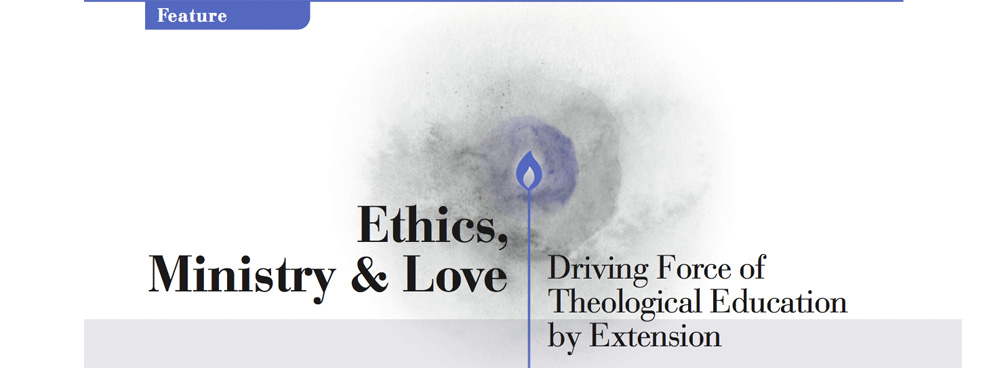
Ethics, Ministry & Love - Driving Force of Theological Education by Extension
Ip Pui Shum
Director of TEE
Enrolling in Theological Education by Extension (TEE) means different things to different people. Some see it as a journey towards a deeper understanding of their faith, to others it is a spiritual oasis, or the first venture into Christian theology. Students are free to choose their learning modes: in-class lectures to experience life transformation together, or through the Internet to undertake distance learning at their own pace. If we ask what motivates Christians to study in extension courses, we will discover that the answer goes well beyond factors such as personal interest or the availability of time, and it takes us all the way into the realm of ethics and ministry. In fact, the most basic motivation is the love for God’s truth ignited by the Holy Spirit in the heart of the believer.
“Need” is a “Driving Force”
Theology needs to make itself available to Christians, for reason that believers are faced with ethical quandaries that have become more complicated than ever. As they engage in the intricate process of making value judgments, Christians need to be sure of their practices being worthy of the gospel they believe. In order to do so, one needs first-hand knowledge of the Bible, and also an understanding of the pattern of biblical themes emerging from the Scriptures in accordance to the framework of doctrinal theology. When religious knowledge is tested in our real-life situations, lessons from the history of the church will definitely be indispensable and beneficial. Hence the various disciplines of theological education (biblical studies, doctrinal theology, church history and practical studies) should all be made accessible to members of the Christian community, so that the Church can be better prepared to serve her Lord and her neighbors.
Even though pressing ethical issues surround the believers’ community, Christians should not overlook two other equally important reasons of study theology. Firstly, the Church is gathered and established by the Holy Spirit to serve the Triune God. Thus, praise and worship, praying and breaking of bread, preaching, teaching and fellowship are important signs of the identity of a Christian community. Confession of the Church together with the action of serving her neighbors are the Church’s primary proclamation of faith. The Church needs to humbly and critically reflect on its own practices, to make sure that they do not deviate from the truth of the gospel and the testimony of the apostles. In other words, theological reflection is a prerequisite for the Church to examine its proclamation of faith. This burden should not just fall on the shoulders of pastors and church leaders, but may also be shared by the congregation under the pastoral leadership. TEE equips Christians to engage in this kind of reflection on their faith.
The Holy Spirit Ignites Man’s Love for God
The Holy Spirit puts a desire in the believer’s heart to go into the depths of God. Believers are attracted to the divine truth and goodness. They respond with love and seek the truth of God in faith. This yearning to know God is the true driving force that inspires the effort of making theological knowledge accessible to the Church. God has poured out His love into our hearts by the Holy Spirit (Romans 5:5), and as Habakkuk (2:14) says, “The Earth will be filled with the glory of the knowledge of the Lord, as the waters cover the sea.” The abundance of Christian life is not limited to being saved from our ethical sense that has been marred by sin or the reorientation of our values; nor is it just the rectification of the focus of our religious activities to the one true God testified by the Bible; but also includes a deep yearning for the Triune God such that our spirit is being drawn constantly by His goodness and eternity, a desire that keeps us searching for the knowledge of the one God who shows mercy to the humankind. This joyful search in faith is like Mary sitting at the feet of the Lord listening to His words, which is a great blessing. It is only when believers have a deep understanding of the life and love of God, and how His mercy is revealed in the person of Christ that the Church can proclaim the work and grace of the Triune God toward the world.
Look Forward – Widening the Spectrum of the Courses
The fact that students love to study the Bible is evident from the enrolment statistics. According to these figures, TEE courses on biblical books, spirituality and growth are more popular than theological studies and church history subjects, and courses on the Christian mission come next. This order of subject popularity is however not static. One can envisage that with a widening spectrum of courses, the interest of the students and their perception of TEE will evolve. For example, where traditional doctrinal theology interacts with life in the contemporary cultural milieu, or where biblical studies cross path with matters of public interest, or where the practical experience and heritage of the Church comes into conversation with urban humanistic values, the interest of our students will be broadened accordingly.
Widening the spectrum of courses requires imagination and resources. “Imagination” is not a theme of theology, but is a constant companion of theological education. When Charles E. Raven, Professor of Theology at Cambridge University, discusses soteriology, he mentions that it has always been the practice to use terminology common in our culture when we discuss the meaning of Christ dying for us, for example, terminology commonly associated with economic activities. Today, TEE also requires imagination to facilitate people to hear divine grace again and to understand how God is working amongst man.






